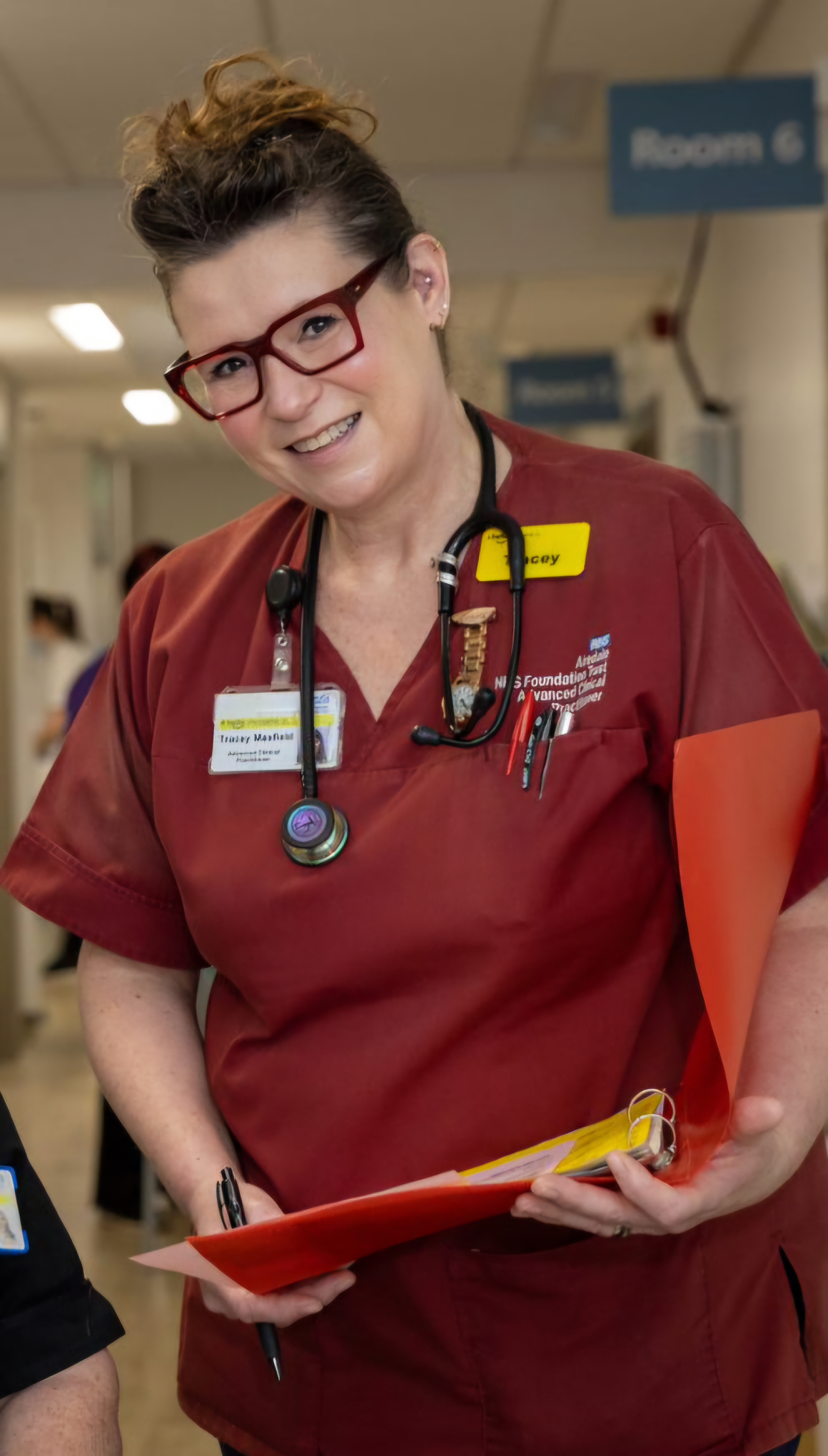

Inspirational Story
Tracey Maxfield
What is your qualified profession and what made you want to progress to this level of practice?
My background profession is diagnostic radiography which I then gained a PGCert in medical image reporting to undertake plain film reporting.
I began to liaise with other AHPs when our Trust (Airedale NHS Foundation Hospital Trust) became more active in promoting the work of AHPs under the initiative commenced by Suzanne Raistrick, Chief CAHPO in 2017.
I represented radiography at meetings and conference and began to learn more about what my fellow AHPs did and the patient caseload they managed.
The role of advanced clinical practitioner (ACP) in medicine began in the Trust in around 2013 and I began to find out more about this hybrid role from the small team operating in acute medicine.
The more I found out, the more fascinated I became and worked with my line manager and Lead ACP to organise a year’s part-time secondment in acute medicine in order to build my clinical skills.
How long have you been an advanced practitioner for?
In terms of the Health Education Engalnd (HEE) definition of advanced practitioner, I started as a trainee ACP in 2017 and qualified in 2021.
As a reporting radiographer, I was given the title of advanced practitioner from 1996 – 2017. I had a PGCert at level 7 from the university of Bradford and was involved in training and teaching reporting both in the hospital and at university.
What route did you take to become qualified at this level?
I commenced a fully funded, part time MSc Advanced Practice (Clinical Practitioner) at the university of Bradford in 2017. The first year of study was during my secondment with acute medicine and then I left radiography altogether and transferred full time into acute medicine to continue and complete the MSc.
my career development has been significant and rewarding. Working collaboratively across multiple professions has broadened my knowledge and continued learning.
How does your role vary from before you were qualified to this level?
It is completely different!
Acute medicine
Whilst working in acute medicine, I managed my own caseload of patients and treated and discharged out-patients attending through our ambulatory care unit. On the in-patient side, I reviewed patients independently and had my own section of the ward round to manage and facilitate discharge and any planned follow up.
I am advanced life support trained and was regularly involved in medical emergency calls with my medical colleagues.
Gastroenterology
I have recently moved jobs and I now work in gastroenterology as the first advanced practitioner in this speciality at the Trust. Again, I am reviewing in-patients, participating in ward rounds, facilitating management of gastroenterology patients and developing the role to work at specialist registrar level equivalent as my experience deepens. There are plans for me to run my own clinic and in-patient follow ups and the clinical director in gastroenterology is encouraging and keen for me to develop a specialist interest.
Non-medical prescribing
I successfully completed the non-medical prescribing course as part of the MSc and as a diagnostic radiographer, the law currently states that I can only prescribe as a supplementary prescriber. I make my own decisions as an independent prescriber would do with regards to prescribing, but always discuss with an independent prescriber and/or the consultant looking after the patient. I am currently updating the clinical management plans that I use to incorporate medication used for gastroenterology specific conditions.
Further education
In terms of further education, I am looking at completing a PGCert in gastrointestinal conditions to commence next year. I have provisional agreement that this can be funded. I think that this would underpin my clinical work and increase my knowledge at level 7.
Leadership
From a leadership perspective, I have more influence in being able to make decisions that ultimately improve quality and service to patients than I did as a radiographer. I require equipment to improve a particular service to a significant cohort of gastroenterology patients and feel confident to work with other areas of the hospital and wider community to facilitate this.
I will be pitching for an apprentice ACP in gastroenterology at the next department business meeting to progression plan and further improve stability and continuity within the speciality.
Links to professional background
With reference to my background profession as a radiographer, my contacts within the department remain and I can advise colleagues on what and how to request imaging. I can now request my own radiological investigations and have clearance to request cross sectional imaging and most interventional procedures (after discussion with radiology). I could not do this as a reporting radiographer.
Publications and research
I have written for publication on several occasions and presented at conferences. This has continued in my current role, and I have recently co-authored chapters in three textbooks on the subject of radiology aimed at an audience of advanced practitioners.
Final reflections
Since stepping outside of my background profession, my career development has been significant and rewarding. Working collaboratively across multiple professions has broadened my knowledge and continued learning. Although this has not been a traditional career path for a radiographer, it is perhaps less unusual in today’s advanced practice than it was 7 years ago.
Advanced Practice
Interested in advanced clinical practice? Take at look at our article to explore this level of practice and routes into working in these roles
Find out more